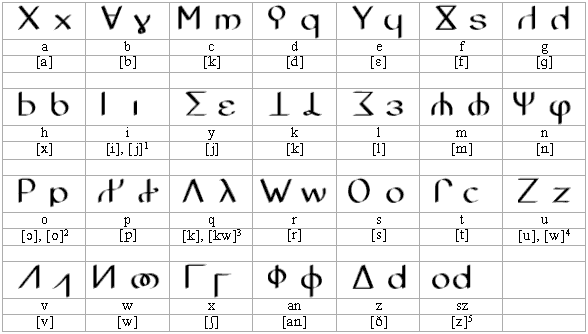The Viozian language and alphabet were created by Dirk Bakker from Groningen in the Netherlands when he was about ten years old (in 1989). Already fond of secret codes and nice scripts, he fantasized about devising a language of his own that nobody could understand.
For the words he started with making a letter-based code in which the letters of the Dutch alphabet were mixed up in random order: a=u; b=x; c=y etc. He did this in such a way that the vowels remained vowels, in order to avoid unpronouncability. Thus for instance the word 'water' (which is 'water' in Dutch) became 'cumok' (w=c; a=u; t=m; e=o; r=k). Next he created the letters, based somewhat on Latin and Greek. Over the years the words became less and less Dutch-like as he created suffixes, cases, pronunciation rules etc. By now a vast and complex grammar has evolved, and the language is still growing and changing today.
A language cannot be fully mature without a people who speak it and a culture by which it is used, so Dirk made up the island of Viozia ('Good Island'). He placed it about 200 miles off the Brazilian coast (later he discovered that there happens to be a real island on the very spot, called Fernando de Noronha) and inhabited it with a primitive but intelligent people who are a mixture of native South Americans and West Africans.
The alphabet script as described below replaced their older logographic script, and has evolved into a number of different styles. The one which is given here is the most common variety nowadays and had the most similarities with Western script (e.g. in the use of capitals and small letters).
Finally Dirk made an computer font for the Viozian language, so now, after almost 16 years, it is possible to share it with all those other language creators around the globe. He hopes they will like it!



![]()
Uqu rose voxukos bakan oi qanp me ook oi koyme. Wom vovoto ga lsuh oi yoazbug os gan wakos ziotos ui ui me zoosp bua gelmo.
/'ukwu 'rɔsɛ vo'ʃukɔs ba'kan oj kwanp mɛ o:k oj 'kojmɛ. wom vo'voto ga l'su:x oj 'joaðbu:g ɔs gan 'wakɔs 'ðjɔtɔs uj uj mɛ ðo:sp bwa 'gɛlmo/
All human beings are born free and equal in dignity and rights. They are endowed with reason
and conscience and should act towards one another in a spirit of brotherhood.
(Article 1 of the Universal Declaration of Human Rights)
Longer sample text (Tower of Babel)
Constructed scripts for: Ainu | Arabic | Chinese languages | Dutch | English | Hawaiian | Hungarian | Japanese | Korean | Lingala | Malay & Indonesian | Persian | Tagalog / Filipino | Russian | Sanskrit | Spanish | Taino | Turkish | Vietnamese | Welsh | Other natural languages | Colour-based scripts | Tactile scripts | Phonetic/universal scripts | Constructed scripts for constructed languages | Adaptations of existing alphabets | Fictional alphabets | Magical alphabets | A-Z index | How to submit a constructed script
[top]
You can support this site by Buying Me A Coffee, and if you like what you see on this page, you can use the buttons below to share it with people you know.

If you like this site and find it useful, you can support it by making a donation via PayPal or Patreon, or by contributing in other ways. Omniglot is how I make my living.
Note: all links on this site to Amazon.com, Amazon.co.uk
and Amazon.fr
are affiliate links. This means I earn a commission if you click on any of them and buy something. So by clicking on these links you can help to support this site.
[top]